executive paywatch

AI-Fueled CEO Pay
CEOs are rushing to incorporate artificial intelligence (AI) into their businesses.
Worker wages are falling behind inflation.
CEO-to-worker pay ratios remain unacceptably high.
ceos continue
S&P 500 Index Company CEO Pay Has Increased $5 Million Over the Past Decade
CEOs continue to make millions while workers’ real wages decline:

In 2022, CEOs of S&P 500 companies received, on average, $16.7 million in total compensation. This was the second-highest level of CEO pay in history for S&P 500 Index companies.
The average CEO-to-worker pay ratio was 272-to-1 for S&P 500 Index companies in 2022; overall, U.S. workers’ real hourly wages fell in 2022 for the second year in a row by -1.6% after adjusting for inflation.
CEO Pay Matters
The ratio of CEO-to-worker pay is important. A higher pay ratio could be a sign that companies suffer from a winner-take-all philosophy, where executives reap the lion’s share of compensation. A lower pay ratio could indicate the companies that are dedicated to creating high-wage jobs and investing in their employees for the company’s long-term health.
Search Companies
stats
How S&P 500 Company CEO Pay Breaks Down
| Pay Type | Average Amount |
|---|---|
| Salary | $1,203,457 |
| Bonus | $306,199 |
| Nonequity Incentives | $2,626,463 |
| Restricted Stock | $9,944,362 |
| Stock Options | $2,106,242 |
| Retirement Plans | $94,334 |
| All Other | $411,769 |
| Total | $16,694,194 |
CEO Pay by State
Too many working people across the country are struggling to afford the basics, much less save for college or retirement. Some states serve as stark examples of the incredible gap between CEOs and the hardworking people who make their companies profitable.
This map shows how the CEO pay at companies headquartered in each state compares to the pay of the average employee in the state.
CEO Pay by Industry
S&P 500 company CEO pay was the highest in the communication services industry in 2022. The average ratio of CEO-to-worker pay is also the highest in the communication services industry, where Live Nation Entertainment had the highest CEO-to-worker pay ratio in the S&P 500 Index of 5,414-to-1.
| Industry | Average CEO Pay | Average Pay Ratio |
|---|---|---|
| Communication Services | $37,581,870 | 508:1 |
| Consumer Discretionary | $14,035,044 | 480:1 |
| Consumer Staples | $14,629,942 | 407:1 |
| Energy | $16,288,704 | 118:1 |
| Financials | $17,672,213 | 218:1 |
| Health Care | $15,991,308 | 225:1 |
| Industrials | $13,299,271 | 196:1 |
| Information Technology | $22,215,146 | 357:1 |
| Materials | $14,015,577 | 218:1 |
| Real Estate | $14,145,284 | 168:1 |
| Utilities | $10,735,588 | 94:1 |
one million
$100 Million CEOs and Artificial Intelligence
Artificial intelligence (AI) is here and here to stay. The New York Times reports that nearly half of all jobs will be exposed to some form of AI automation that will disrupt and displace workers.
This AI revolution has the potential to unleash greater productivity and create broad-based prosperity, but it also has the power to cause widespread job loss and dramatic income inequality if CEOs and wealthy corporations have the final say.
This moment presents a clear choice for our society.
Right now, employers are deploying increasingly sophisticated AI-enhanced technologies without workers’ consent to monitor workers and to hire, control, evaluate, discipline, and even fire workers.
These powerful algorithmic monitoring tools can have significant negative impacts on employee privacy, economic security, dignity and autonomy on the job.
Wealthy CEOs like Bob Iger, whose new employment agreement as the returning CEO of the Walt Disney Co. promises him $31 million annually, believes workers’ calls for just compensation and protections from job disruption are not “realistic.”
To protect our jobs, our rights and our futures, workers must lead the way.
Whether AI is used to empower working people or is used to dehumanize work is a choice. By coming together in unions, we can negotiate for how AI will be used.
The AI future will be here soon as CEOs are rushing to incorporate AI into their businesses without protections for workers or workers having input on how AI will be used. Here is how the 10 highest-paid CEOs in 2022 are using AI:

Stephen Schwarzman, Chairman and CEO
Blackstone Inc.
$253,122,146
1,068:1 pay ratio
Sundar Pichai, CEO
Alphabet Inc.
$225,985,145
808:1 pay ratio
Stephen Scherr, Chair and CEO
Hertz Global Holdings Inc.
$182,136,137
4,983:1 pay ratio
Barry McCarthy, CEO and President
Peloton Interactive Inc.
$168,073,420
2,299:1 pay ratio
Michael Rapino, President and CEO
Live Nation Entertainment Inc.
$139,005,565
5,414:1 pay ratio
Safra Catz, Chief Executive Officer
Oracle Corp.
$138,192,032
1,842:1 pay ratio
Douglas Ingram, President and Chief Executive Officer
Sarepta Therapeutics Inc.
$124,938,694
494:1 pay ratio
Bill Ready, Chief Executive Officer
Pinterest Inc.
$122,651,735
999:1 pay ratio
Kiwi Camara, Co-Founder, Chief Executive Officer and Director
CS Disco Inc.
$109,531,440
Undisclosed pay ratio
Carl Eschenbach, Co-Chief Executive Officer
Workday Inc.
$102,685,309
439:1 pay ratioCase Study: How AI is Undermining Job Security in the Entertainment Industry
Artificial Intelligence (AI) is starting to revolutionize the entertainment industry. AI chatbots have been called “plagiarism machines” for creating movie and television scripts based on screen and television writers’ previously written content. AI can be used to duplicate background actors and even create synthetic performances using deep fake technology.
In 2023, screen and television writers affiliated with the Writers Guild of America and performers affiliated with SAG-AFTRA went on strike against the Alliance of Motion Picture and Television Producers. These members are seeking a voice in how AI is used in the entertainment industry to protect their rights to the content they have created.
To ensure that AI does not undermine the role of human beings creating media and entertainment content, workers are demanding safeguards with the use of AI for writing scripts and for creating synthetic performances. Here are the CEOs of the major entertainment companies and their 2022 total compensation:
| Company | Name | Title | Total Compensation | Pay Ratio |
|---|---|---|---|---|
| Apple Inc. | Tim Cook | Chief Executive Officer | $99,420,097 | 1,177:1 |
| Netflix Inc. | Reed Hastings | Co-Chief Executive Officer, President and Chairperson of the Board | $51,073,237 | 234:1 |
| Netflix Inc. | Ted Sarandos | Co-Chief Executive Officer and Chief Content Officer | $50,299,296 | 230:1 |
| Amazon.com Inc. | Douglas Herrington | CEO, Worldwide Amazon Stores | $43,215,779 | 1264:1 |
| Amazon.com Inc. | Adam Selipsky | CEO, Amazon Web Services | $41,113,295 | 1202:1 |
| Warner Bros. Discovery Inc. | David Zaslav | President and Chief Executive Officer | $39,288,458 | 227:1 |
| Comcast Corp. | Brian Roberts | Chairman of the Board and Chief Executive Officer | $32,069,850 | 385:1 |
| Paramount Global | Robert Bakish | President and Chief Executive Officer | $32,046,006 | 291:1 |
| The Walt Disney Co. | Robert Chapek | Former Chief Executive Officer | $24,183,003 | 446:1 |
| Fox Corp. | Lachlan Murdoch | Executive Chair and Chief Executive Officer | $21,748,681 | 237:1 |
| Sony Group Corp. | Kenichiro Yoshida | Chairman and CEO | $15,395,569 (est.)* | Undisclosed |
| The Walt Disney Company | Robert Iger | Chief Executive Officer | $14,998,299 | 276:1 |
| Amazon.com Inc. | Andy Jassy | President and Chief Executive Officer | $1,298,723 | 38:1 |
*Sony CEO Kenichiro Yoshida received the following compensation for the fiscal year that ended March 31, 2023, during which the average exchange rate was 135.4 yen to the U.S. dollar:
| Fixed Remuneration | 240 million yen |
| Remuneration Linked to Business Results | 411 million yen |
| Stock Acquisition Rights | 160,000 options x 3,123 yen = 500 million yen |
| Restricted Stock | 80,000 shares x 11,586 yen = 927 million yen |
| Other Benefits | 7 million yen |
| Total Compensation | 2,085 million yen |
Take Action
Say You Stand with Striking Screen and Television Writers and Performers
Hollywood studios have used the transition to video streaming to cut writer and performer pay and want to use new artificial intelligence technologies to undermine working conditions for workers in the entertainment industry at all levels. Say you support the striking workers and think they should get a fair deal with responsible AI provisions:
Sign Now in Support of Striking Writers
Learn How You Can Support Striking Performers

